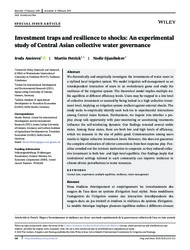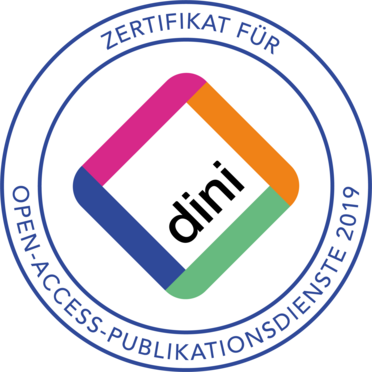Investment traps and resilience to shocks: An experimental study of Central Asian collective water governance
DOI: https://doi.org/10.1002/ird.2704
Persistent URL: http://resolver.sub.uni-goettingen.de/purl?gldocs-11858/10385
Persistent URL: http://resolver.sub.uni-goettingen.de/purl?gldocs-11858/10385
Amirova, Iroda; Petrick, Martin; Djanibekov, Nodir, 2022: Investment traps and resilience to shocks: An experimental study of Central Asian collective water governance. In: Irrigation and Drainage, Band 71: 110 - 123, DOI: 10.1002/ird.2704.
 |
Dokument öffnen: |
We theoretically and empirically investigate the investments of water users in a stylized local irrigation system. We model irrigation self‐management as an interdependent interaction of users in an evolutionary game and study the resilience of the irrigation system. The theoretical model implies multiple stable equilibria at different efficiency levels. Users may be trapped in a low level of collective investment or succeed by being locked in a high collective investment level, implying an irrigation system resilient against external shocks. The study seeks to empirically identify such lock‐ins in experimental interactions among Central Asian farmers. Furthermore, we inquire into whether a pre‐play cheap talk opportunity with peer‐monitoring or sanctioning treatments influence the self‐reinforcing dynamic. Our findings revealed several stable states. Among these states, there are both low and high levels of efficiency, which we measure in the size of public good. Communication among users results in higher collective investment levels. However, this does not guarantee the complete elimination of inferior conventions from best‐response play. Penalties crowded out the intrinsic motivation to cooperate as they reduced collective investment in both low‐ and high‐level equilibria. Our findings imply that institutional settings tailored to each community can improve resilience to climate‐driven perturbations in water resources.
Statistik:
ZugriffsstatistikSammlung:
Schlagworte:
Central Asiaexperiment
multiple equilibria
resilience
water management
Asie centrale
expérimentation
équilibres multiples
résilience
gestion de l'eau
This is an open access article under the terms of the Creative Commons Attribution‐NonCommercial‐NoDerivs License, which permits use and distribution in any medium, provided the original work is properly cited, the use is non‐commercial and no modifications or adaptations are made.

